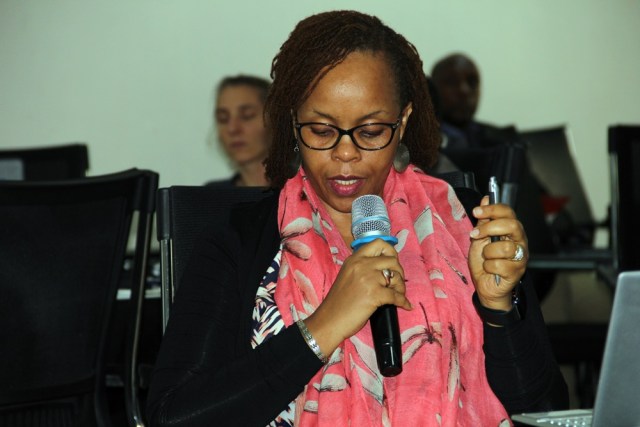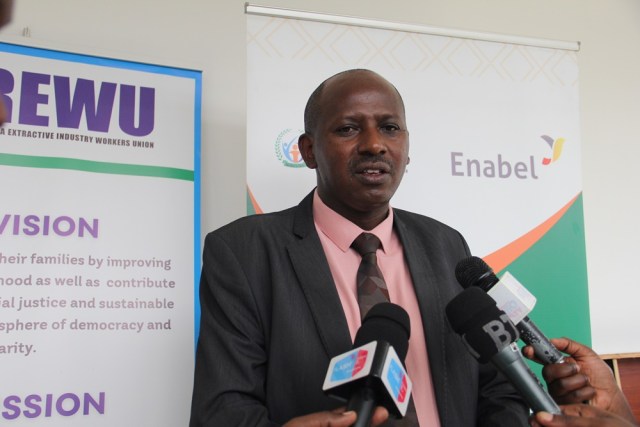Enabel, REWU convened key actors to validate the Preliminary results of the Study on the occupational safety, health and working conditions in the mining sector

Enabel, together with REWU, have recently brought together key actors to validate the preliminary results of a groundbreaking study on occupational safety, health, and working conditions in this crucial industry.
By Ange de la Victoire DUSABEMUNGU
Kigali, Friday, the 27th of October, 2023, with the support of Belgian Development Agency (Enabel) in Rwanda, the Rwanda Extractive Industry Workers Union held a validation meeting on the safety and health conditions in the Rwanda’s mining sector.
The study was conducted by the Rwanda Extractive Industry Workers Union (REWU) under the funding from the Belgian development agency (Enabel) in Rwanda which is providing support to ensure health and safety measures are applied in mining sector.
The event was far from a solitary affair. Representatives from a variety of institutions, all involved in promoting decent work in the mining sector, attended the meeting.

These included delegates from the Ministry of Public Service and Labor, the Rwanda Mining Association, the Rwanda Mining, Petroleum and Gas Board, FES Rwanda, Enabel, CESTRAR, RSSB among others.
The crux of the meeting was the validation of a study, but this was no ordinary research. The study aimed to assess factors and causes leading to poor occupational safety and health and working conditions in mining Sector.
It was an opportunity to shed light on a sector that often operates underground, to bring to the forefront the challenges and risks that miners face every day.

So, what were the key points discussed during this meeting? The focus was on identifying and addressing the factors leading to poor safety and health conditions in the mines.
The discussion highlighted the necessity for improved regulations, training, and equipment. It emphasized the need for a collective effort from all stakeholders to ensure the well-being of workers in the mining sector.
Commenting on the validated study findings, Eng. Mutsindashyaka Andre, the Secretary General of the Rwanda Extractive Industry Workers Union (REWU) said that “We decided to undertake this study because we often encounter the issue of lacking concrete evidence to support our claims when advocating for mine accidents.”

Eng. Mutsindashyaka Andre, the Secretary General of the Rwanda Extractive Industry Workers Union (REWU)
“Simply stating that there is excessive dust or darkness in the mines is insufficient, as we lack the necessary evidence to substantiate our statements. We expressed concerns about potential illnesses stemming from the darkness in the mines, but we lacked evidence to support our advocacy. Whenever we presented our case, they requested proof, which we failed to provide. The study’s findings will aid our advocacy efforts for miners and assist relevant institutions in addressing the identified issues and finding solutions.” He added.
According to Mr. Narcisse DUSHIMIMANA, Head of Mining Regulation and Inspection Department at Rwanda Mines, Petroleum and Gas Board (RMB): “This study will help us in several ways. Firstly, it will allow us to determine our current position or standing.”
He noted that “There are certain issues that are widely acknowledged but lack concrete evidence. This study will provide us with the necessary proof. Based on the findings, we will be able to develop strategies to address each identified problem systematically.”

He, however said “some of the problems identified by this study are primarily found in mines where traditional mining practices are practiced. This is mainly attributed to the low level of investment, which in turn leads to the occurrence of these issues in the working environment.”
He also said “There are also failures to abide by labor laws” adding that “One possible solution is to promote professional mining, encourage investment, and bring in mining engineers who can handle the job professionally. These actions are among the solutions for the aforementioned problems.”
During the meeting, Ms. Shema Ida Murangira, Representative from Enabel promised the continuous collaboration with the Rwanda Extractive Industry Workers Union and other actors to ensure that health and safety measures are applied in the mining sector as one of the intervention areas that Enabel is supporting.

Shema Ida Murangira, Representative from Enabel
Ms. Murangira explained that “When it comes to measuring risk, it is extremely difficult to speak in front of people without information, so I sincerely thank REWU for providing that. Another important point that was mentioned is risk response, risk transfer, and risk acceptance. Understanding who is responsible and where everyone stands is crucial in managing risk.”
She talked about the consideration of skills transfer to ensure the sustainability of the Rwanda’s Mining sector.
“Now that we understand the type of risk we are dealing with, particularly when working in Mining. There is something that I haven’t heard, which I really wanted us to discuss, and that is skills. Skills are not about attending school, that’s knowledge. However, when it comes to skills, we are referring to the elderly individuals who possess these skills, which are necessary in this profession and we know that in the mining sector, we have so many elderly people, and I’m saying elderly, those that are above 30, but we have an influx of young people who are close to 30 and that’s our target, because those are the ones that are going to take up the mining sector” she said.
“How can we transfer the skills and knowledge of occupational safety from those who have already experienced it to those who have yet to encounter it? Since it is a skill that is acquired through experience and working, how can we pass on this expertise to the younger generation who can be able to take on that responsibility after you?” she asked the participants to consider that aspect as another contribution to the sustainability of the mining sector.

Ms Murangira also touched the issue of the increased safety measures that give women full enjoyment in working in the mining sector.
“We are actively advocating for gender equality and specifically aiming to increase the representation of women in the mining sector. We understand that working in this industry can be challenging, but we firmly believe that women are just as capable of succeeding in this field. We kindly request that you prioritize the inclusion of women and ensure they are aware of their safety rights in the workplace. It is essential to have a substantial number of women working, employed, or running their own businesses to enhance the employment rate within our country.” Said.

According to Ms. Anne Felmet who represented FES Rwanda during the validation meeting “the study shows that there is work that needs to be done from all of us.”
“I think a workspace should be safe for everyone, no matter where they work and it showed us that here there is room for improvement, although there has already been some improvement, but we need to join forces here and I think to work together and improve this.” She said.
“We have a strong trade union working on this topic. We have the ministry represented here who committed to this. We have the employers represented. So it couldn’t be better than the combination of people we have in this room here today. I’m very optimistic that this is a start of a process that will lead us far.” Ms. Anne added.
In his remarks, Mr. Patrick Kananga, Chief Labor in the Rwanda Ministry of Public Services and Labor, said, “We are pleased to be here as the Ministry of Public Service and Labor in this process to collectively examine the working conditions and law enforcement in the mining sector.”

He stated that, “In regards to decent work, it is the responsibility of the Ministry of Public Service and Labor. The first column of the responsibility includes what is referred to as decent work, but they also include productive work. This means that the Ministry bears the responsibility outlined in that comprehensive national directive.”
He observed, “The country is committed to create at least 1.5 million jobs every year, but they insist that these jobs must be of decent and productive.”
“So, REWU decided not to fall behind and suggested conducting a study to identify the challenges in the Mining sector as we conclude NST 1 (National Strategy for Transformation) to ensure that the challenges are addressed and not taken into the next phase of the transformation strategy” Mr. Kananga said.
In summary, the validation meeting served as a platform for key industry players to come together, discuss, and validate a study that could potentially transform the mining sector. It emphasized the importance of safety and health in the mines, and the collective responsibility towards improving working conditions.
According to experts, “Occupational safety and health in the mining sector is a pressing issue that requires immediate attention and action.
This meeting was a step in the right direction, a glimmer of hope for the hardworking miners who risk their lives every day. As we wrap up, remember this.
Behind every precious gemstone and metal, there’s a miner whose safety and health deserves our utmost attention. And together, we can make a difference.






















































